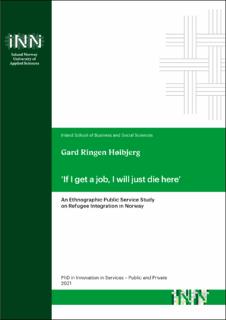‘If I get a job, I will just die here’ : An Ethnographic Public Service Study on Refugee Integration in Norway
Doctoral thesis
Permanent lenke
https://hdl.handle.net/11250/2757478Utgivelsesdato
2021Metadata
Vis full innførselSammendrag
In this study, I examine refugee integration efforts in four rural municipalities in Norway. The aim of the study was to understand how these municipalities work with refugee integration. Through ethnographic fieldwork, I followed public service employees and settled refugees in their everyday lives.
Refugee integration has been a pressing topic in Norwegian public debate over the past 20 to 30 years, and the state, municipalities, voluntary organisations, and private individuals have persistently tried to solve the problem. Despite service innovation in the work of integrating immigrants and refugees and ongoing discussions regarding what integration should look like and how it should be achieved, no consensus has yet emerged. In other words, refugee integration is a complex social problem for which there does not appear to be a finite answer or solution.
In this study, I use theoretical approaches from recent service research to examine the municipalities’ work in implementing the Introduction Act, which was enacted by Norway’s Storting in 2003–2004 and is a comprehensive service offering aimed at newly arrived refugees in need of basic qualifications. The act, operationalised through introductory programmes offered to settled refugees establishes a full-time, year-long programme that aims to help resident refugees in need of basic qualification.
To study this work, I use public service logic (PSL) as a theoretical tool, framing the analytical approach with contributions from research on wicked problems and other social science concepts. Wicked problems are characterized by their insolvability, and the services offered with the aim of alleviating such problems are based on an articulation of a problem-solution complex. Such complexes reflect how all problems are defined around a possible solution: the problem and the solution are thus two sides of the same coin.
This study examines refugee integration processes in Norwegian municipalities from the viewpoints of both settled refugees and public service employees. In doing so, it seeks to shed light on how refugee integration is conducted and perceived from these different perspectives. Through this study, I argue that municipal work with refugees requires constant adjustment. The nature of this work is captured through the concept of bricolage, where both employees and refugees associated with the services are exposed to persistent internally and externally driven changes that affect the service process – and refugees’ value creation.
